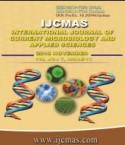


 National Academy of Agricultural Sciences (NAAS)
National Academy of Agricultural Sciences (NAAS)

|
PRINT ISSN : 2319-7692
Online ISSN : 2319-7706 Issues : 12 per year Publisher : Excellent Publishers Email : editorijcmas@gmail.com / submit@ijcmas.com Editor-in-chief: Dr.M.Prakash Index Copernicus ICV 2018: 95.39 NAAS RATING 2020: 5.38 |
The development of fruits without fertilization is known as parthenocarpy. Parthenocarpy improves the fruit quality, processing attributes, production and productivity of vegetable crops like tomato, cucumber, watermelon etc. Absence of seeds can enhances the shelf life of the fruits, allowing a better conservation, fruit set in adverse climatic conditions, early and offseason production of vegetable crops. Therefore, it is important to ensure yield stability regardless of environmental conditions. Breeding of new cultivars with the ability to develop fruits without pollination or any artificial stimuli is a promising approach. Parthenocarpic vegetables can be natural or can be induced artificially by various methods like, use of plant growth regulators, distant hybridization, mutation, use of irradiated pollen, alternation in chromosome number, gene silencing, gene modifications and genome editing tools. Therefore, present review is focused on genetics, nature of gene action, mapping of QTLs and various breeding methods to induce parthenocarpy in vegetable crops.
 |
 |
 |
 |
 |